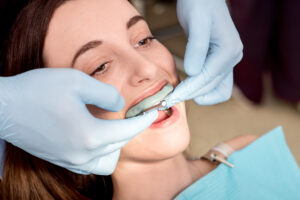 If you suffer from chronic headaches without knowing the cause, you could have a misaligned jaw. This is known as TMJ (Temporomandibular Joint) Disorder, and it can have very painful effects. Moreover, it can also cause — or be caused by — Bruxism, or chronic teeth grinding. In today’s blog, your Astoria, NY, dentist talks about both issues and describes the ways we can offer you relief.
If you suffer from chronic headaches without knowing the cause, you could have a misaligned jaw. This is known as TMJ (Temporomandibular Joint) Disorder, and it can have very painful effects. Moreover, it can also cause — or be caused by — Bruxism, or chronic teeth grinding. In today’s blog, your Astoria, NY, dentist talks about both issues and describes the ways we can offer you relief.
What Exactly Is TMJ Disorder?
As noted above, it is when the joints that connect your lower jaw to the base of your skull become unbalanced and misaligned. Because we use these joints for a wide range of unavoidable activities, like biting, talking, and eating, it is difficult for them to heal on their own. Additionally, the joints contain a large network of nerves, so it can be extremely painful. The most common symptoms of the disorder are headaches, earaches, migraines, and jaw popping. In severe cases, pain and discomfort can be felt in the shoulders and even the lower back, as well. What’s more, is a misaligned jaw can also result in teeth grinding — also known as bruxism.
What Is Bruxism?
It is persistent teeth grinding that often occurs while sufferers are asleep. It is linked with TMJ Disorder because jaw misalignment can stress one’s muscles and nerves while asleep, causing their teeth to grind and clench. Similarly, if the primary issue is Bruxism, it can cause TMJ Disorder because the grinding can throw the jaw out of whack. As you can see, both conditions are intertwined and can exacerbate one another.
How Are They Treated
Treatment for both conditions is similar. Both often require mouthguards to be worn while asleep. For TMJ Disorder, the nightguard repositions one’s jaw into proper alignment. For those with Bruxism, the appliance prevents teeth from grinding in the night. Regardless of which one you suffer from, your dentist will craft an appliance that is custom-made to fit your mouth. Because of its precision, it will fit comfortably in your mouth, and you will get used to wearing it quickly. If you think you might suffer from either condition, it is important to reach out to your dentist quickly before serious damage is done to your mouth and teeth. If left untreated, you might need cosmetic or restorative procedures done to fix damaged teeth.
Contact Us To Learn More About TMJ Disorder & Bruxism
If you suffer from frequent headaches, or you notice your teeth or jaw aching, you could very well have either of these conditions. We encourage you to reach out to us as quickly as possible, so we can assess your mouth. If you have any questions or would like to schedule an appointment, please call Jeffrey Leibowitz, DDS, in Astoria, NY, today at 718-728-8320.


